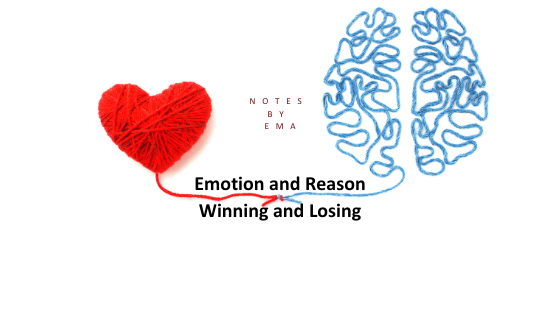Many hundreds of years ago, a very smart man realized that the greatest obstacle man had to contend with was his emotional nature. He reasoned this way. I bring his thoughts to you with some editorialization but, again, these are his and not my own. I will leave it to you to decide what you agree with and what you do not.
More often than not, man’s emotional nature masters his rational nature and leads him astray. When emotions are unrestrained and undirected by knowledge and intelligence, they violently attach themselves to anything that chances to excite them. Their stark immediacy vitiates man’s judgment. He is unable, while under their sway, to select and follow the course that is best because his mind is engulfed by the evanescent present. In his hectic desire to gain the passing pleasure, man loses his ultimate good.
The very elements in man’s nature, which cause him to fall are the means by which he can make himself rise. He can pit one emotion against another and the stronger will not merely win but win over the weaker. The most spiritual forms of human love have the same emotional foundations as the most bestial forms of human lust.
To learn how to become the master of one’s emotions, to learn how to free oneself from their bondage is, therefore, the primary condition of sustained and rational happiness. The key to virtue is knowledge of oneself. Only when we have our emotions under control are we able to consistently direct our activity towards a definite, rational goal. Our activity then follows our own nature, and not from the nature of external things, which arouse our emotions and determine their strengths.
The dominant ethics of Western civilization have made a special point of disregarding the ultimate connection that exists between human nature and rational conduct. Morality has been identified, not with living a life according to rational plan and adequate conception of an ideal form of human existence, but with the strained attempt to live in accordance with the inherited system of coercive social habits.
Marriage, for example, is sanctified not by the ceremonial law of a priest or a city clerk but rather by the divine and natural law of love, yet we are coerced into thinking it is the former that should keep a marriage together so when it falls apart it does so with considerable collateral damage to children, egos, and families. Free love is love that is free from priests and city clerks and can be the only rational and logical bases for any marriage like trust and clarity are for any relationship.

The virtue of the mind is there not to despise and reject but to understand and transform. How often do we see the former in action and controlling so much behavior because some moron or another gets offended by some very small thing?
The most efficient way to preserve one’s being is not by competitive but rather cooperative activity based on reason and not emotion. Helping each other because it is to our own long-term selfish interest is more reliable and more powerful than when it is because we claim to love the individual. How many individuals have claimed love and ended up hating? Every marriage starts with a forever dream and promise of “in sickness and in health, for better or for worse”. Then half of them end up in some form of divorce or separation, most unpleasantly, and the other half stay together for practical reasons like costs or family or reputation while they are enjoying and playing elsewhere. Does reason prevail and drive happiness or does emotion prevail and drive unhappiness?
In my experience, winning organizations, especially in times of war, are those that just do not allow the stupidities of emotions, biases, prejudices, superstition, egos, and all these factors to enter their decision-making process. You may allow them to express themselves in the discussion process as a way of allowing release and venting but never in the decision-making process. Decisions need to be made rationally. Period. Nice and cold.
There is a conflict between science and superstition. Mysteries, unknown and unknowable powers, miracles, magical rites, and prayerful incantations are instruments not of religion but of superstition, which has its origin in ignorant and ignominious fear.
The freeman does not fear and he is not consumed by fear’s natural conceit.
If we are to win the gold and thrive through this present COVID-19 challenge — and the many more to come in the Yrastorza 300-year history — it must be because we embrace rational thinking and use intelligence and knowledge to weed out superstition and emotion. This is particularly difficult in a culture that is steeped deep in the superstition of religious institutions. We need to keep that ignorance away from our business and leave it to the right of people to independence without anarchy. One has every right to do as he wishes in his personal life but does not have the right to bring emotion into the usage of the money of a third party — the shareholder. Affecting the shareholder return affects the benefits that the other stakeholders of the business, our community, the government, etc. can gain from the success of our commercial activity.
Winning activities include the self-confidence to admit error and adapt versus getting offended because we are made to look bad because of our own competence. The competent never look bad.


EMA’s 2025 Reads | The Age Of Outrage